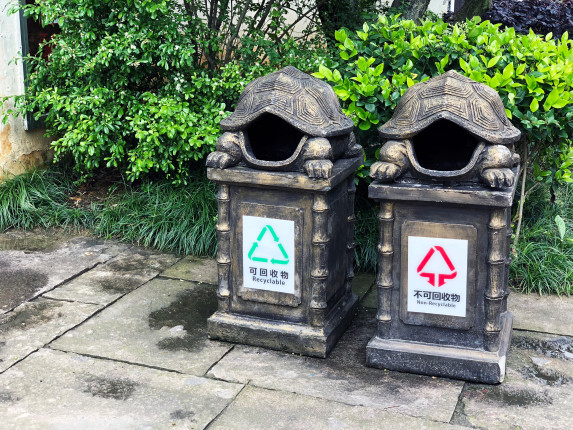-
Energizing Zero-waste Practices in Rural China: Q&A with Chen Liwen and Qiu Yuxue of China Zero Waste Village
June 24, 2021 By Tongxin Zhu
Growing up in Xicai village in rural Hebei Province, Chen Liwen spent plenty of her childhood outdoors, where she cultivated a deep connection with nature. This connection eventually led her to pursue a career working at environmental NGOs. Early in her career while she was surveying landfills outside of Beijing, she discovered “mountains” of putrid waste that were leaking into waterways, making nearby residents sick. That incident sparked her to focus her work on reducing waste and waste pollution. After working on urban waste issues Chen became concerned that pollution reforms to expand waste sorting and recycling in cities were not extended to rural areas, where 40 percent of China’s population live.
Mirroring consumption trends in China’s urban areas, higher living standards in rural areas have also sparked more purchases of foods packaged in single-use plastics. Today, rural Chinese consumers generate more than 280 million tons of waste annually (equal to U.S. annual municipal waste), yet only 36 percent of this waste is properly treated. Due to limited waste infrastructure, treatment capacity, and insufficiently trained local officials, it is common to see piles of plastic waste surrounding villages.
In 2017, Chen Liwen founded Zero Waste Village. The group has already helped more than 24 villages and five townships set up new waste sorting programs. Today, Chen is shifting more of her focus to townships as those governments can spread good waste practices to surrounding villages in their area. We sat down with Chen Liwen and Qiu Yuxue to discuss Zero Waste Village and what their expectations are for the future.
China Environment Forum (CEF): Why did you start your waste sorting work in rural areas?
Chen Liwen: China’s rural areas face very severe waste management challenges. While cities have incinerators in China, rural areas do not, which provides us an opportunity to build a sustainable waste management system from the ground up that does not waste valuable waste. Fifty percent of rural waste is compostable food waste and unlike cities, rural areas have the space to treat compostable waste and use it as fertilizer. One advantage to working on waste in rural China is that village communities are relatively small and people know each other, making it easier for local governments to engage residents, and implement and supervise the waste sorting programs.
CEF: What was your experience in the very first village?
Chen: Laishui County, Hebei Province was our first village. The China Foundation for Poverty Alleviation approached us hoping to build a new rural tourism project and it was important to have a system to handle more waste and keep the area attractive for visitors. Our first pilot was a complete experiment without much financial support. We even bought trash cans and hardware ourselves—green ones for compostable waste and yellow ones for non-compostable. We spent the first two weeks going door-to-door to teach the villagers how to sort waste and incorporate waste sorting into their routine.
CEF: What are some of the lessons you learned?
Chen: We found that a “do it all” approach like we did in Laishui County was not sustainable, and it left the village committees without much information about how to manage the waste sorting after we left. We have learned it is very important to mobilize local actors—in particular, village committees—because they are the source of administrative power in rural areas.
Over time, we became more effective at door-to-door mobilization and education, finding compost sites, and scaling up our work to the town level. Working more at the township level has helped overcome the limitations we encountered with some village committees that often lack a strong systematic governance structure.
CEF: What does your new plastic reduction initiative look like?
Qiu Yuxue: In Dongyang Township, 90 percent of the inorganic waste being collected is plastic waste. This is why we included plastic reduction as one of our organization’s strategic goals. The large-scale replacement of plastic still needs policy support but we are pursuing important bottom-up efforts working to awaken local awareness of waste management and environmental protection, and introducing bamboo products as plastic alternatives.
We have done a lot of work to get people involved to reduce plastic. For example, when we investigated single-use plastic products, we held popular science lectures on how serious the plastic waste problem is and its threat to the environment and human health. We did some advocacy activities such as displaying hand-painted posters at the local market and promoting bamboo baskets instead of plastic bags.
CEF: What does the future hold for Zero Waste Village?
Chen: We will continue educating others about rural waste sorting. Each year we hope to build new partnerships with towns that are willing to sort waste and to provide technical support to villages for their sorting practices. We are also thinking about how to manage waste in urban-rural fringe areas.
In Dongyang Township, Jiangxi Province, our waste sorting advocacy and education work has shown exciting results. The amount of daily waste transported from Dongyang to landfills in nearby Shangrao city has decreased by over 50 percent from 2018 to 2019. Today, in Dongyang our main focus is operating an education center to share lessons learned on waste sorting and plastic reduction with more villages. We plan to prepare courses and teaching materials for business and government officials that visit the center.
CEF: Who motivated your work in environmental protection and waste reduction?
Qiu: I think Chen Liwen is an innovator in terms of rural waste sorting, which is why I’m here as a part of the team. Another champion for me would be Shenzhen Zero Waste. I knew them from the flagship program Toxics-Free China. They are solving deep, sometimes elusive problems related to hazardous chemicals in an innovative way that awakens public awareness. They tackle this huge topic by starting small from daily consumer products and pushing changes on the producer’s side.
Chen: Liao Xiaoyi, the founder of Beijing Global Village motivated me. She shared her thoughts and experience working on China’s environmental problems in a TV talk show called Her Village. I was inspired to do research and learn about environmental protection. Later, I volunteered and then worked with Beijing Global Village, where I developed my path in waste management through environmental activism.
This blog is part of the Closed Loop Innovator Series which profiles stories of women around the world innovating in business, civil society, and science to reduce plastic waste pollution.
Tongxin Zhu is a research assistant at the Wilson Center’s China Environment Forum. Her current focus is ocean plastic waste in China with an emphasis on consumer-facing industries. She graduated from Georgetown University, McCourt School of Public Policy with an MPP degree.
Sources: China.org.cn, Ministry of Ecology and Environment of People’s Republic of China, New Security Beat, People’s Daily, Sina Blog, Toxicsfree.org.cn, Tsingyan Research, Washington Post, Xinhua Net, Zero Waste Village Official WeChat
Lead photo credit: Turtle recycling bins, shutterstock.com/askarim
Topics: China Environment Forum
 A Publication of the Stimson Center.
A Publication of the Stimson Center.








